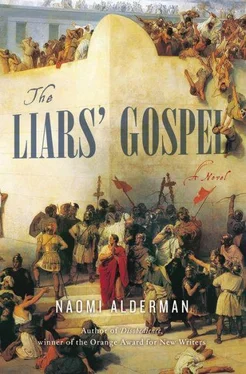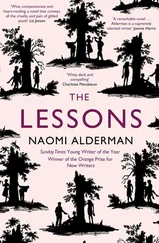“Jerusalem, yes, very well. A good place to find new followers, but then what? Will you wander like this forever? Like a tent-dweller, with no place to find rest?”
“God will show me. God Himself and no other.”
She frowned.
“You should come back to Galilee. We have fine pastures, the fishing is good. Bring your people there. Settle. Be a great man in Galilee. Yes!”
“It is not mine to decide. I follow the will only of God.”
And this enraged her. Thinking of all she had done for him and how he was as stupid as a stone.
“Grow up,” she said. “The will of God is all very well, but we must also plan for ourselves. Be a man.”
“Like my father?”
“I will bring your father!” She could not control herself now, she took any weapon to throw at him. “He will come here with your brothers and they will bring you back home and stop all this nonsense!”
Yehoshuah looked at her benignly. She felt afraid of him. What a foolishness, to be afraid of her own small boy.
“I love my father,” he said.
“That is not what you used to say,” she snapped back.
“I have learned a great many things,” he said.
“And you have not learned to send for your mother, or send her word that you are well, or write to her, or give her the honored place at your table.”
He drew her to him and kissed her on the top of her head. “Ima,” he said, “you will see such things, you will be amazed.”
But he would not come home.
“Gidon is my grandson,” she says.
The tax collector knows her, and all her children and grand-children. He does not believe her. She can see his disbelief in his face. She will have to try harder.
“He is my grandson, son of my son Yehoshuah, who died. He got him on a whore in Yaffo many years ago and I did not know it till last year, when he came”—here she makes her voice waver like an old, grieving woman—“when he came and found me and told me signs and I saw in his face that he must be that child.”
The tax collector laughs. He mutters something to the soldiers and they chuckle too. The mood has changed again. She does not know what they are joking about. That she has taken in the son of a whore, who could be any man’s? That she boasts of it? That she has been deceived by an obvious fraudster looking for an easy home and meals provided? Perhaps among all this they will not notice another lie.
“He came last year, you say? About when?”
“In the summer,” she says quickly, “between the Feast of Seven Weeks and New Year.”
Around the square, there are looks from one to another, another to a third. It is a hard thing she is asking of them. If none of them contradict her, they will all be accomplices. If Rome finds out they have lied, the whole village will burn.
The tax collector looks at them suspiciously, waiting to see if any will break. No one speaks.
“Well,” he chuckles, “if you have a whore’s son in your home, don’t let us detain you! Perhaps you find him as skillful as his mother!” He chuckles to himself, then, evidently disappointed by the lack of laughter from the crowd, translates his joke for the soldiers, who are as amused by it as he.
No one speaks to her after the soldiers leave. Rahav and Amala and Batchamsa are all there, but they do not embrace her or comfort her. Their looks are wary.
At last, Rahav says, “You have put us in danger, Miryam.”
It’s true. She will have to set it right.
Gidon comes down from the mountain after two days. He has heard what she’s done before he sees her, she can read it in his solemn face.
He looks different now from the way he was when he first came to Natzaret. Working outdoors has weathered and darkened his skin. He is not so thin, that’s her good stews and bread. The place where they took off his fingers has healed to a fine silver scar across the end of his right hand. The way he works now you’d think he’d been born like that. He will be all right, she tells herself, when he has to leave.
She gives him lentil soup with flatbread and he eats it greedily. A thin dribble of the sunny liquid drips down the scraggly beard on his chin. He finishes, and she tries to take the bowl from him to wash, but he holds on to it with his maimed right hand, the three fingers stronger than both her arms.
He says, “Why didn’t you tell them where I was?”
She lets go of the bowl. She sits down opposite him.
He says, “I didn’t come here to bring danger to you all. That isn’t what I wanted, I didn’t…”
He slams his good hand down on the table. The earthenware pot jumps. He reminds her of her son at that moment. The memory brings a sickness to her stomach, and the sickness makes her angry.
“Why did you come, then? What was it for? To stir up an old woman in her grief? To plague me with your love for a dead man?”
He looks as if he is about to say something, but stops.
She says, “There is no reason, except that you wanted a place to hide and knew that telling me your stories would make me take you in.”
He stares down at his hand. At the place where his fingers were. He traces the line of the scar with his left thumbnail.
He says, “I came to bring you good news.”
She says, “There is no good news. My son is dead. That is all the news there can be.”
He says to her, so softly that she can barely hear the words, “He is risen.”
She does not know what to say, does not think she has understood, so she says nothing.
He looks at her, to see if she has grasped the heart of his words.
There is such a wild hope in her.
She has had dreams like this. Dreams in which the men come to her and say, “It was a mistake! He has not died, he was rescued. He is still alive.” And dreams, more painful yet, in which she knows that she has one day, one hour to speak to him, that he has returned so she could cradle his head against her body and smell the scent of him and hear the sound of his voice. She has lost the sound of his voice.
Gidon says, “He died and rose again. A miracle made by God. He showed himself to Shimon from Even, and to Miryam from Migdala, and to some others of his friends. He is alive, Mother Miryam.”
His voice cracks and his eyes burn and water and his face glows with a fervent intensity and she finds a feeling rising up inside her so strong and so immediate that at first she cannot identify it until suddenly she finds that she is laughing.
She laughs as if she were vomiting, it is from the stomach not from a glad heart.
He is hurt by her laughter. He thinks she is mocking him, although this is not what is happening.
He says, affronted, “So laughed Sara our foremother, when God told her she would give birth to a child at ninety years old, and yet it came to pass.”
And she stops laughing, although she cannot help a smile from creeping to her lips, as if she were merry.
She says, “You are too old, Gidon, to believe this.”
He feels a flush across his cheeks.
He says, “They came to the tomb, Mother Miryam, the tomb where he had been laid, and the body was gone. He had risen.”
And she laughs again. “Are you so foolish? Are you so unwise? Gidon, I sent my sons for his body as soon as the Sabbath was over. So that he would not lie in a stranger’s cold chamber when he could be buried in the warm earth, like his forefathers.”
He looks at her, puzzled and aggrieved, and mumbles, “Yet he is risen. He has been seen.”
She says, “Did you come here for this? To convince an old woman that her dead son yet lives?”
He says nothing. She is angry now.
“If he lives, if they did not kill him, if he revived in the burial chamber, if God returned him to me, why is he not here, Gidon? Whom should he see more than his mother? Why would he show himself to Shimon and to Miryam from Migdala and not to me?”
Читать дальше












